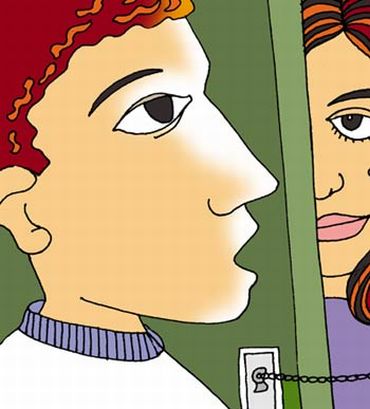Courtesy LoveMatters.info
Sex before marriage is not only frowned upon by Indian society, but also by more orthodox sections of communities abroad. But does the promise of unmarried youngsters to abstain from intercourse before marriage make any difference? Maybe not. Illustrations: Uttam Ghosh
Over 60 percent of teens taking virginity pledges break their promise not to have sex until after marriage.
Pledges only work if teens have a high level of religious commitment. The problem is most teens taking them don't. In fact, non-pledgers are better at abstinence than pledgers who lack religious commitment.
Doctoral candidate Antoinette Landor presented these unpublished findings recently at the World Congress for Sexual Health in Glasgow this summer.
Sex
In the US alone, 24 percent of youngsters between the ages of 12 and 17 take a written or verbal vow not to have sex before they get married.
Abstinence-only sex education promotes these virginity pledges (VP) as an effective way of preventing risky sexual behaviour. The US spent over 191 million on these abstinence campaigns in 2008 alone.
Despite all this financial support for VP's, researchers found that 65 percent of girls and boys who sign a VP have sex before marriage. And an even higher number of them have oral sex -- 76 percent of girls and 81 percent of boys.
What are your views on Indian youth and their sexual behaviour, as compared to their Western counterparts? Do you think the findings abroad would also apply to teenagers in our country? Let us know on the messageboard below.
© www.lovematters.info is a journalistic website about love, sex, relationships and everything in between.
Lip service
Despite the high number of failures, 72 percent of all pledgers still considered themselves religious or highly religious. Yet this seems to have little influence on their behaviour.
The authors discovered commitment matters more than religious participation. Simply going to church or attending religious gatherings is not enough.
Religiously committed pledgers were more likely to succeed. They tend to pray more and rank the importance of God and spirituality in their lives as greater.
Peer pressure
So why do teens with low levels of religious commitment bother to sign VPs that they don't keep?
Peer pressure is one of the reasons why this happens, explains Antoinette Landor.
Landor highlights in her presentation just how poorly prepared these pledgers are when it comes to sex. Because they don't think they'll have sex before marriage, they lack knowledge and awareness of what safe sex is.
"They are more likely to have a higher number of sex partners and a higher number of oral sex partners. They are more likely to not delay sex, and engage in sex without any contraception."
Don't work
"When you take religion out, the bottom line is that if you use only abstinence programmes as sex education, the likelihood is that the number of teens engaging in unsafe sex increases because they have been left out of information on condoms and contraception," says Landor.





Comment
article